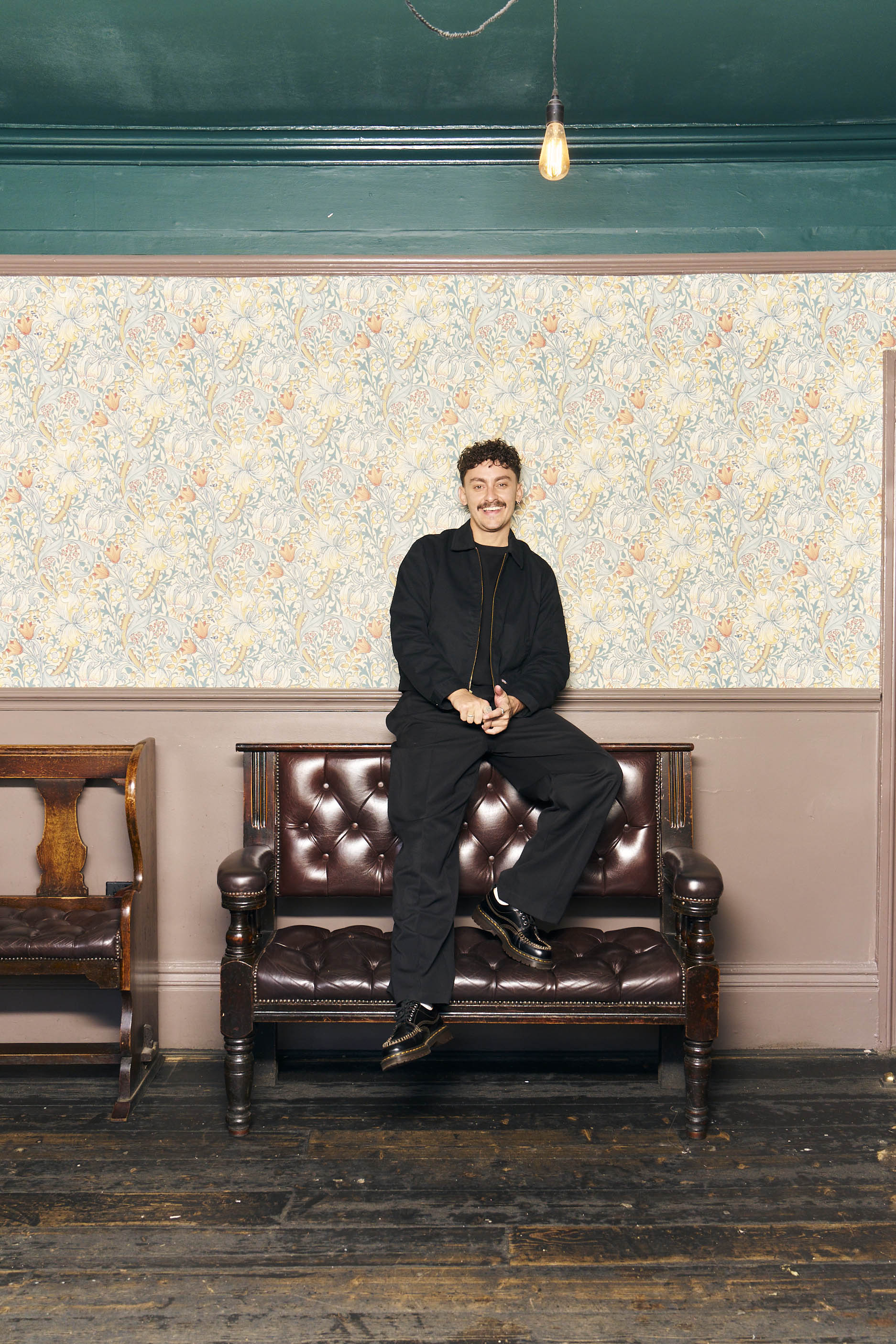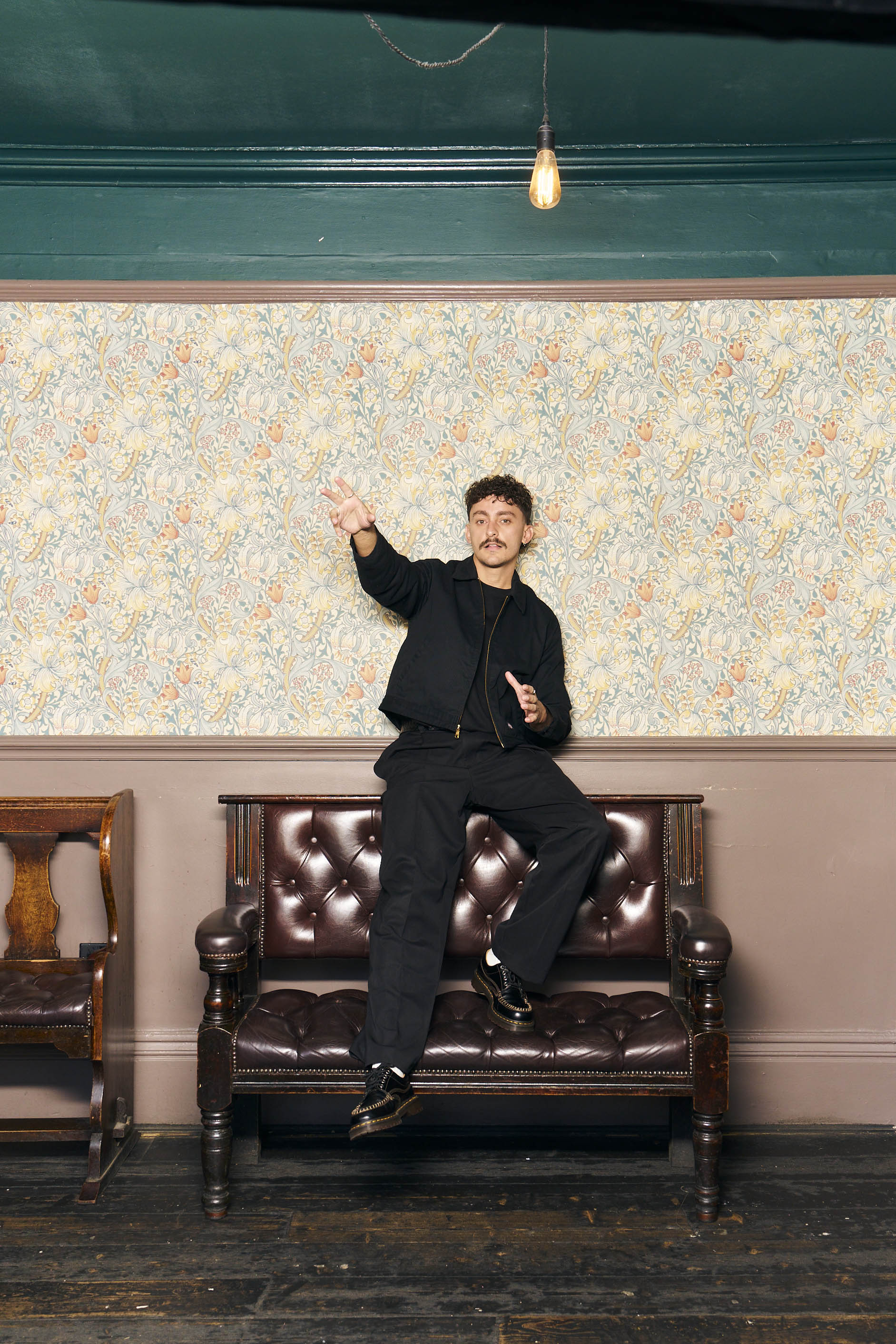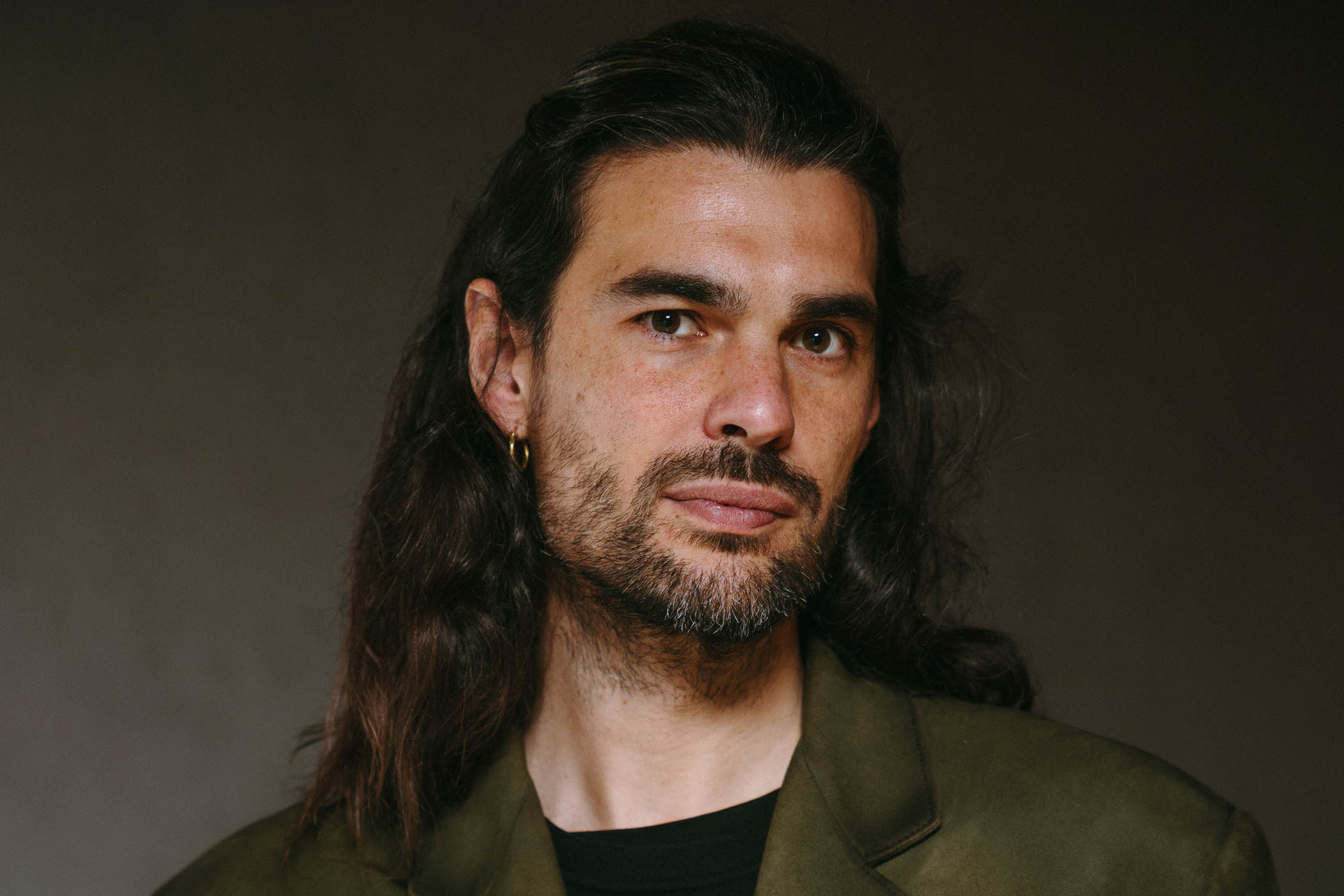Photography by Suki Dhanda
It’s often a problematic vibe, waiting for a pub to open its doors for the day, but here Antony Szmierek and I are, at 11.57am on a sunny Wednesday, kicking our heels outside the Castle in Manchester’s Northern Quarter. Szmierek, a 34-year-old musician, has a bouncy energy, and is quick and enthusiastic to hug. When – finally! – the Castle opens up at 12.02pm, he asks the barman if it is too early for a Guinness. The barman responds… Well, what do you think?
We take our drinks upstairs to a brown room that Szmierek decides looks like it should host a wake. It is empty except for a jukebox that we will learn, over the course of the next hour and a bit, seems only to play Fleetwood Mac’s Rumours. “I don’t really live anywhere – I’m in hotels a lot,” he says. “But if I’m home, I’ll come here and have a pint. You know, if I want to feel really, overly Mancunian.”
Szmierek, who has dark hair in tight ringlets and a tidy moustache, wears all black – T-shirt, trousers, leather shoes – a sober contrast to his usual uniform for live shows and promo photos. “I’ve kind of come as myself today actually,” he says, “Not in the tracksuit, the football top, the trainers.” He checks if the volume of the jukebox will affect the recording of our conversation. “It’s going to be like one of my songs,” he says, as that iconic escalating bassline builds in the background. “It will just be me talking over the end of The Chain. Exactly the same.”
If you listen to BBC Radio 6 Music, or even Radio 2, you will be familiar with Szmierek’s music, which layers bookish, character-led spoken word over indie-infused dance beats. (Probably the most nailed-on description of his sound is the title of his EP: Poems To Dance To.) Szmierek has become a go-to for many of the BBC’s radio DJs, including Lauren Laverne, Craig Charles, Zoe Ball and Jo Whiley. In 2023, Laverne gushed that his breakthrough track, The Hitchhiker’s Guide to the Fallacy, was “the best thing I’ve heard all year,” and promptly described him as “Mike Skinner spliced with Simon Armitage”.
Szmierek, whose debut album, Service Station at the End of the Universe, was released in February, was also front and centre of the BBC’s Glastonbury coverage: on Thursday performing The Great Pyramid of Stockport in the Treehouse, and on Friday night supporting Billy Bragg on the Left Field stage. “Really great that we wrote a song about a pyramid,” says Szmierek, smiling. “Thank God!”
Or, you might have heard Szmierek and not realised it. Last summer, after watching a disappointing England draw 1-1 against Denmark in the men’s Euros in the pub, he heard something familiar: his song, The Words to Auld Lang Syne, had been picked by the BBC for the end-of-show montage. “There’s loads of that song that weirdly worked in the context: ‘Tomorrow’s never promised, but neither was today,’” he says. “And, ‘Shoulder to shoulder, doubtful, but just the same amount as always.’ What we found out later on was that there was a song for a win, a song for a draw and a song for a loss, and ours was the song for a draw. Which I like, I think that’s a good album title: Songs for a Draw. Sad but happy.”
In the pub that day, Szmierek had to pinch himself. “I’m watching it going, ‘Somebody tell me this is happening and I’ve not gone mad,’” he recalls. “Because, as has been widely established, I was an English teacher until 18 months ago.”
This is indeed true: Szmierek taught English at a secondary school for five years until 2020, before moving to a college for school leavers with special educational needs. It was only during the Covid pandemic that he bought himself a keyboard and a drum machine and learned to make music. Until Christmas 2023, he was still in school full-time. “Honestly, it was three bits of life-changing news every day, and I was supposed to be at work,” he says. “I would open my phone and go, ‘Fuck! I’ve just booked Jools Holland!’ Or, ‘We’re doing Reading and Leeds.’ Or, ‘We booked Glastonbury.’ I was living this double life.”
In recent months, Szmierek has had the unsettling experience of seeing his former students in the crowd at gigs. It happened last month at Parklife festival in Manchester. “I went out on the stage to do a line check and it was like, ‘Mr Szmierek!’” he says. “I saw the face of a child. And you go, ‘I used to teach you in year eight and now you’re 20.’”
Newsletters
Choose the newsletters you want to receive
View more
For information about how The Observer protects your data, read our Privacy Policy
Perhaps the clearest indicator of how Szmierek’s life has changed is that people, even ones he didn’t used to teach, know how to pronounce his name now: it’s “Smeh-rik”, rhymes with “Derek”. “People used to be like, ‘Are you that Antony... that guy?’” He shakes his head. “On the best days, it’s the most exciting thing in the world. I’m honestly walking through the city, looking at the fucking buildings, being like, ‘I can’t believe I’m alive. I’m the luckiest man who’s ever lived, and I could do anything.’”

Antony Szmierek at the Castle Pub, Manchester. ‘What freaks me out is that we’ve got this far without a chorus’
Szmierek’s name comes from his father, a Polish man everyone called “Smez”, whom he never really knew. Smez was an alcoholic who separated from Szmierek’s mother when Antony was four, and died when his son was 23. At the time, Szmierek was just starting out as a teacher, and he had to decide whether to keep his father’s name. “Two reasons I didn’t change my name,” he says. “First one: my mum’s maiden name is Ball. So I would have been ‘Mr Balls’ forever as a teacher, which would have been shit. And the second reason was that I really wanted to, like, gentrify the name.”
With his mum and younger brother, Szmierek grew up in Hyde, six miles east of central Manchester. When I tell him that I’ve been to the town for work, Szmierek raises an eyebrow.
“Harold Shipman?” he asks.
“Ricky Hatton,” I say.
“The boy!” he says. “There’s not many of us: me, Ricky Hatton, Harold Shipman and Tony Husband, the cartoonist.”
Szmierek’s mother, who came from a big Catholic family, worked a couple of jobs as a cleaner. “She cleaned in the cigarette factory for fucking ages,” he says. “She works now” – a pause – “well she manages a team now, she’s worked her way up, in a sexual health clinic. Very useful!”
His background was working-class, but the only real downside of that, Szmierek thinks now, was that it failed to encourage ambition. “It was a happy childhood,” he reflects. “Just, at school, no one gave a shit, no one cared. Everyone was just going to go and work in Morrisons. You were going to be a paramedic or a police officer or a teacher, they were the jobs that existed. There was no aspiration that you could be a writer or an actor.”
Still, he became the first member of his family to go to university, and as a teacher he took one form from year seven through to year 11. It turned out to be the making of him; as he talks about it, his eyes go moist and his voice catches. “I’m sorry, man,” he says, dabbing his eyes with his sleeve. “It’s just, you raise them from when they are 11 and it gave me everything. My understanding of the world was born of that. Everything suddenly made sense. I understood community. I understood what the world was outside of my own selfish 22-year-old brain. I understood everything.”
Szmierek is convinced there is a direct link between teaching and his success in the music industry: communication, engaging an audience, winning over doubters. “It’s so obvious for me,” he says. “It’s one thing falling over and hitting another thing.”
The parallels don’t stop there. Szmierek has a busy summer of festivals – culminating in Leeds and Reading at the end of August – and loves the challenge of winning a new crowd over. “It’s like doing a supply lesson,” he says. “It’s so similar. So, you’ve got your gang at the front who know who you are, and who’ll be like, ‘No, be nice to him,’ sort of thing. Then you’ve got everyone else who’s indifferent, or like, ‘Jo Whiley said this was good, but I think it’s shit. And I don’t like dance music. Show me what’s so good about it.’ I thrive in that situation.
“What fucking freaks me out,” he goes on, “is we’ve got this far without a chorus. Sometimes I lie awake in the middle of the night going, ‘There’s no bit for people on shoulders to chant back. Fuck, we need choruses!’”
He drains his Guinness. “But yeah, long may it continue.”
Service Station at The End of The Universe is out now via Mushroom Music



